October 31, 2023
An earlier policy of improving language rights for Kurds in Turkey under Recep Tayyip Erdogan has fallen by the wayside.
When Turkey’s health minister, Fahrettin Koca, announced in September that online medical prescriptions would be available not just in Turkish but in English, Arabic, Russian, French and German, it was the glaring absence of Kurdish that critics of the government leapt on.
Kurds are the second largest ethnic group in Turkey after Turks, speaking an Indo-European language of at least 25 million people scattered across Turkey, Iraq, Syria and Iran, and in diaspora communities around the world.
Yet in the century since the founding of the modern Turkish republic, the right of Kurds to speak Kurdish has never been recognised.
“Discrimination against the presence of Kurds and widespread and systematic obstructions and practices against the use of the Kurdish language in public spaces are also evident in the decision taken regarding the E-Prescription system,” the Diyarbakir Bar Association in southeastern Turkey said in a statement following Koca’s announcement.
Noting the fact that Koca himself is a Kurd from Erdogan’s own Justice and Development Party, AKP, Kurdish journalist Maaz Ibrahimoglu asked: “Do Kurds not get sick? Do they not take medicine?”
For Ibrahimoglu, Turkey’s refusal to recognise Kurdish and allow its use in schools and public life reflects a policy of assimilation.
“If the state ends the Kurdish language it will also assimilate the Kurds,” he told BIRN. “Today there are millions of Kurds who claim to be Kurdish but do not speak Kurdish.”
Policy of ‘assimilation’

The true number of Kurds in Turkey is not known given that the Turkish constitution forbids the collecting of data on ethnicity.
Estimates vary between 10 and 30 million out of Turkey’s total population of 85 million.
Kurds dominate in Turkey’s eastern and southeastern province, but more than half of the Kurdish population today lives in more developed cities of western Turkey having migrated in search of work.
Article 3 of the Turkish constitution states unequivocally: “The Turkish State, with its territory and nation, is an indivisible entity. Its language is Turkish.”
Omer Faruk Gergerlioglu, a rights activist and MP with the pro-Kurdish Green Left Party, said Kurdish has been the victim of a policy of “Turkification” for almost a century.
“The recent prescription decision is only part of this,” Gergerlioglu told BIRN. “Kurds cannot have education, health service or religious service in their own language. Without this, the younger generation in particular tend to forget their mother tongue”.
Fevzi Bulgan, general coordinator of the Diyarbakir-based Kurdish Language Movement, HEZKURD, agreed that everything begins with language.
“The biggest problem of Kurds is assimilation,” he said. “Half of the Kurds have migrated to the West [of Turkey] and they are moving away and forgetting their culture and language.”
For a language to survive, Bulgan said, it must be used in learning.
“If a language is used to learn something, it has meaning; just being a spoken language is not enough,” he said. “The government should switch to Kurdish education step by step but first and foremost education in primary schools should be in the mother tongue.”
Ibrahimoglu noted the fact that in Greek and Armenian schools in Turkey, teaching occurs in Greek and Armenian, a right enshrined in the Lausanne Treaty of 1923 that ended the Turkish War of Independence and granted certain rights to non-Muslim groups. No Muslim minority groups – Kurds, Arabs, Bosniaks or Albanians – enjoy such rights.
Schoolchildren can choose to take Kurdish classes, but Ibrahimoglu said the state “prioritises other optional courses such as Religious Culture and the Quran”, so fewer students choose Kurdish. According to Ibrahimoglu, a little over 20,000 children chose to take Kurdish in the 2021-22 academic year.
Erdogan backtracks from ‘revolutionary’ change

While Kurdish is suppressed, Gergerlioglu pointed out that German or Russian tourists are provided with translators in Turkish hospitals, “even where Kurds constitute the majority. But there is no service in the Kurdish language”.
“In touristic areas or in major cities, Imams deliver their sermons in other languages too but not in Kurdish. Therefore, Kurds righteously say that they do not have same rights even as tourists, even though they are citizens of this country. This is shameful.”
It wasn’t always like this.
In the early 2010s, after a first decade in power, President Recep Tayyip Erdogan took some steps to build bridges with the Kurds, a policy that Bulgan in Diyarbakir called “revolutionary”.
That was when the government proposed Kurdish become an optional course in schools; Kurdish-language public TV channels opened, street signs were translated into Kurdish in eastern and southeastern Turkey and new academic programmes began to train Kurdish language teachers.
But the subsequent political alliances Erdogan formed with Turkish nationalists and the failure of Kurdish parties to present new initiatives meant the policy was quickly forgotten.
Erdogan’s ruling AKP “has taken many positive steps with regards the Kurdish language,” said Ibrahimoglu, but since the inauguration of a presidential system in 2018, concentrating power in the hands of the increasingly autocratic Erdogan, “Kurdish language began to decline in every sphere”.
“For instance, libraries with Kurdish names were closed. Kurdish signs in cities where Kurds constitute the majority were taken down.”
Kurdish-language broadcasters and newspapers are suffered too from a general crackdown on media freedom under Erdogan since a failed 2016 coup attempt.
“Currently, the only newspaper publishing in Kurdish in Turkey is Xwebun,” said Ibrahimoglu. “The reporters and editors of this newspaper are constantly dealing with imprisonment and detention. In addition, there is [public broadcaster] TRT KURD but there government propaganda is generally made in Kurdish.”
Even in parliament, Kurdish MPs are forbidden from speaking Kurdish. If they do, they are muted by the parliament speaker, while the records of the session identify the language as ‘X’.
Bulgan said that Kurds would not give up.
“Kurds are a constituent people of this country,” he said. “We are aiming to get status of a constituent people’s language and education in the mother tongue. As a start, our proposal is to make Kurdish language compulsory for at least two hours a week in primary, secondary and high schools.”
“We are starting with Kurdish, but other living languages of Turkey such as Bosnian, Albanian or Laz should have the same rights. These languages should be accepted as constituent peoples’ languages.”

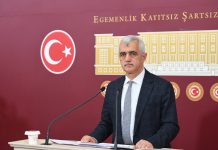
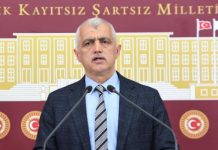
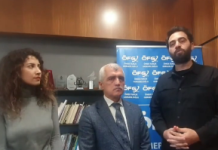



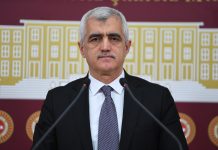
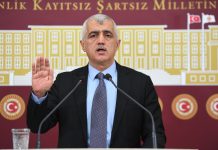
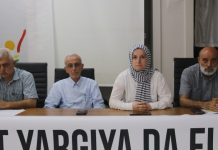

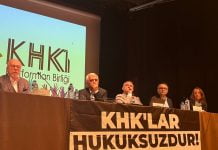
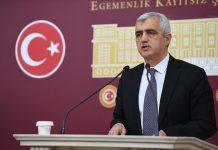
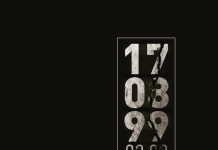
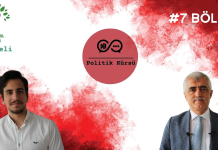

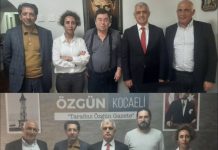
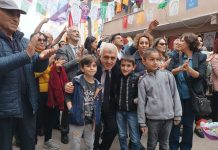
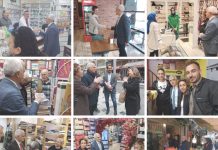
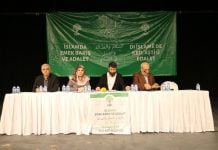






Yorumlar